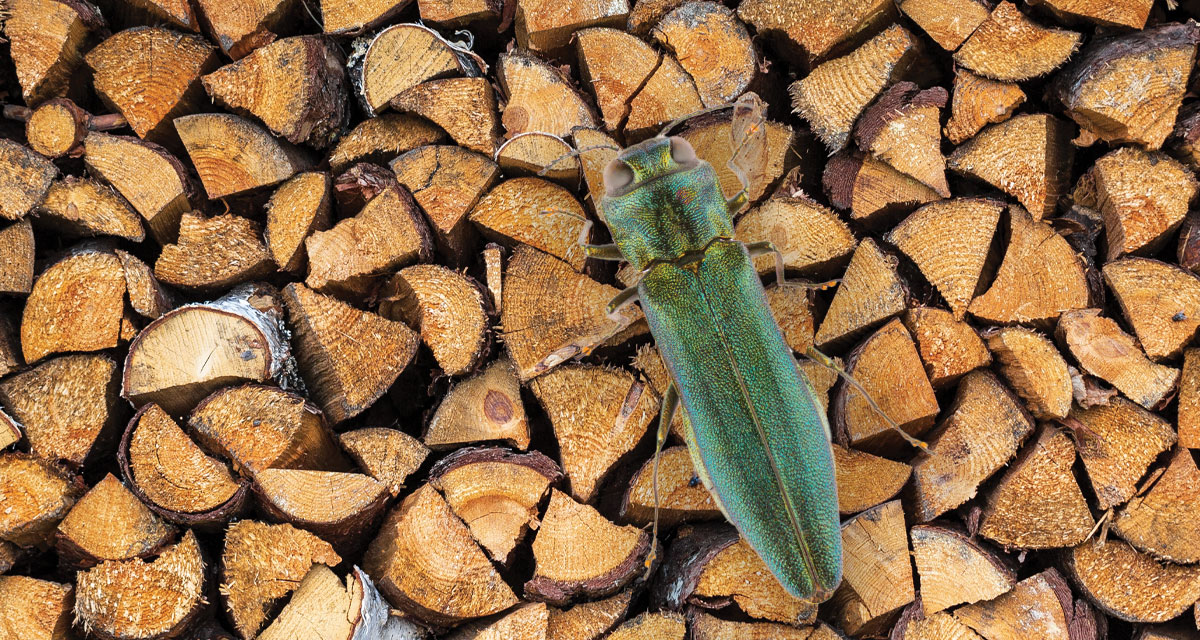Layer by layer, the stacks of 18-inch firewood were transferred into the bed of a truck, intended to keep the family warm during a camping trip three hours away. Two young boys, mesmerized by the arrival of insects scurrying out of the sunlight, began moving the logs to dig further. “Daddy, look what we found!” While insects are fascinating, invasive species are easily transported to new ecosystems, causing a substantial risk to our wildlife and health. The “Don’t-Move-Firewood” movement is growing. You, too, can become a well-informed advocate!
The Emerald Ash Borer
Snakes, mice, and other small burrowing creatures seek out dark places, protected from the elements, to find food. The experts admit to only sometimes detecting pin-head-sized insect eggs or microscopic fungus spores in a woodpile; yet, these tiny threats are enough to destroy an entire ecosystem. In 2012, a research team found burying insects continued to emerge years after the tree became pieces of firewood. More specifically, in other studies, 47% of purchased firewood bundles still harbored infestations of live boring and invasive species, after two years. Additionally, 23% of wood contained the Emerald Ash Borer, a metallic green beetle that feeds on the tissues beneath the bark of ash trees.
It is just one of many invasive species destroying our state’s white, green, Carolina, and pumpkin ash trees, totaling 100 million trees nationwide. Infestations also connect to human health, resulting in cases of cardiovascular and lower-respiratory-tract illnesses.
For additional information, access the link www.emeraldashborer.info.
Buying Safe Firewood
The North Carolina Department of Agriculture and Consumer Services, NCDA & CS, approves of heat-treated or kiln-dried firewood; however, these methods cannot prevent the European Gypsy moth, the Sirex Woodwasp, the Asian Longhorned Beetle, the Redbay Ambrosia Beetle, or the Walnut Twig Beetle from emerging. Homeowners and campers are encouraged to purchase firewood within a 15-mile radius of its origin. While the mileage can be a limitation, it’s vital to ask questions and learn more about the location of cut wood. Additionally, wood transported from another state should not be piled, but quickly burned.
Tip: All North Carolina National and State Parks require firewood to be heat-treated; therefore, consider supporting our parks and buying their locally sourced bundles and tinder.
Tip: If you are camping, call the campground in advance to learn whether firewood is sold on-site or locally. Do not take any leftover firewood with you at departure, including hiking sticks!
Tip: Currituck, Dare, and Haywood counties have unique regulations to help their residents and visitors understand the dangerous environmental hazards and health concerns present. As a result, moving any log up to four foot long across quarantine boundaries is illegal. Fortunately, the NCDA & CS provides up-to-date information for individuals at newpest@ncagr.gov.
Recommendations for Storing Firewood
In approaching the winter season, consider the following safety rules:
- Store firewood away from homes, especially wooden structures, to reduce the risk of exposing a home to wood-damaging insects.
- Elevate logs to facilitate drying.
- Regarding any wood suspected of harboring invasive insects, the solution is to burn or bury it immediately.
Bug Fest
What better location for children to learn about insects than a festival in Raleigh, presented by the N.C. Museum of Natural Sciences, the N.C. Forest Service, and the Plant Protection Section of the North Carolina Department of Agriculture & CS Plant Industry Division. The September event promotes the “Bad Bugs of the Forest” event, discussing the risks of firewood and tree-killing invasive species through interactive games, crafts, activities, and more than 100 exhibits. In addition, festival-goers can even taste a six-legged arthropod! Mark your calendars for the next annual Bug Fest in September 2023.
Tip for Parents: A great interactive website for children to learn more about protecting trees from tree-killing bugs is https://www.dontmovefirewood.org/.
The “Don’t-Move-Firewood” movement is a national program; however, many individuals are unaware of its impact on new ecosystems and lives. Start today by sharing the message and teaching your children the benefits of learning about harmful and beneficial bugs!























